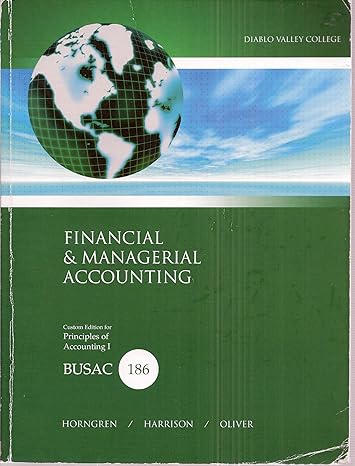Question
corporate accounting, where financial reporting plays a pivotal role in ensuring transparency and accountability, a multitude of complex issues and standards must be addressed. Imagine
corporate accounting, where financial reporting plays a pivotal role in ensuring transparency and accountability, a multitude of complex issues and standards must be addressed. Imagine you are a senior accountant at a multinational corporation and tasked with providing a detailed analysis of various accounting aspects:
Financial Statement Preparation: Explain the fundamental principles and regulatory requirements involved in the preparation of financial statements for a publicly traded corporation. Elaborate on the importance of these financial statements, including the balance sheet, income statement, and statement of cash flows, in presenting an accurate picture of the company's financial health to investors and stakeholders.
Revenue Recognition: Describe the key challenges and guidelines associated with revenue recognition in the corporate accounting context. Discuss the impact of the Financial Accounting Standards Board's (FASB) adoption of the new revenue recognition standard (ASC 606) and its implications for reporting revenue accurately, especially in industries with complex revenue streams like technology and telecommunications.
Asset Valuation: Explore the methods and principles involved in valuing assets on a corporation's balance sheet. Discuss the differences between historical cost accounting and fair value accounting, and provide examples of when each method might be more appropriate. Explain how these valuation methods impact financial reporting and decision-making.
Goodwill and Intangible Assets: Explain the accounting treatment of goodwill and intangible assets, including how they are initially recognized, amortized, and assessed for impairment. Discuss the importance of impairment testing for goodwill and intangible assets, particularly in the context of mergers and acquisitions.
Income Tax Accounting: Delve into the complexities of income tax accounting for corporations. Discuss deferred tax assets and liabilities, the effective tax rate reconciliation, and the implications of changes in tax laws on financial reporting and tax planning strategies.
Share-Based Compensation: Analyze the accounting treatment of share-based compensation, including stock options, restricted stock units (RSUs), and employee stock purchase plans (ESPPs). Explain the impact of stock-based compensation on a corporation's income statement and balance sheet, as well as the related disclosures required in financial statements.
Financial Statement Analysis: Discuss the tools and techniques used to analyze a corporation's financial statements, such as ratio analysis, trend analysis, and common-size financial statements. Explain how these analytical methods can help investors, creditors, and management assess a company's financial performance and make informed decisions.
Ethical Considerations: Address the ethical challenges that can arise in corporate accounting, including issues related to financial reporting, auditing, and internal controls. Provide examples of corporate scandals and accounting frauds that highlight the importance of ethical behavior in accounting.
Corporate Governance: Explore the role of corporate governance in ensuring the integrity of financial reporting within a corporation. Discuss the responsibilities of the board of directors, audit committees, and external auditors in maintaining transparency and accountability.
International Accounting Standards: Compare and contrast the Generally Accepted Accounting Principles (GAAP) used in the United States with International Financial Reporting Standards (IFRS) used in many other countries. Discuss the convergence efforts between these two sets of accounting standards and the implications for multinational corporations.
In your response, please draw from relevant accounting principles, standards, and real-world examples to provide a comprehensive understanding of these topics and their significance in the corporate accounting landscape."
Step by Step Solution
There are 3 Steps involved in it
Step: 1

Get Instant Access to Expert-Tailored Solutions
See step-by-step solutions with expert insights and AI powered tools for academic success
Step: 2

Step: 3

Ace Your Homework with AI
Get the answers you need in no time with our AI-driven, step-by-step assistance
Get Started


